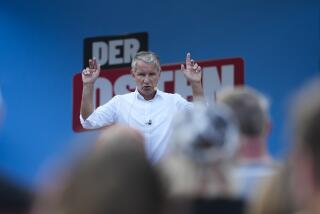Reunification Without Tears
- Share via
East and West Germany are hurtling toward political reunification, propelled by the once rigorously Stalinist state’s increasingly rapid economic decline. Last November’s unsealing of the border between the two states, rather than easing the concerns of East Germans about their future, has encouraged many to flee their onerous present.
As a result, East Germany is being bled of its skilled labor force and its ability to meet basic economic needs. On March 18, East Germans will vote freely for the first time in 57 years. Reunification talks are likely to start almost immediately after. That momentous event is coming sooner than anyone had expected, and certainly sooner than anyone had prepared for, including the U.S. State Department.
Over the weekend, West German Chancellor Helmut Kohl announced that Soviet President Mikhail S. Gorbachev had told him Moscow accepts the inevitability of German self-determination, and, moreover, won’t insist that a reunified Germany be a neutral Germany. This led to Western speculation that Gorbachev would even tolerate a unified Germany remaining within NATO. East German officials say Gorbachev told them that simply isn’t so. An example of wishful thinking in the West, or of mixed signals from Gorbachev? For now, it isn’t clear.
American policy is still evolving. President Bush, at his news conference Monday, said a united Germany that remained in NATO would be “reassuring and stabilizing.” Reassuring to whom? Mainly--and in a seeming paradox--to the Soviet Union, which lost 20 million dead in its war with Nazi Germany, and to some of the Eastern European countries that suffered proportionately under brutal German occupation.
Anyone who has bothered to look knows that the West Germany of 1990, with its well-rooted democracy, bears scant resemblance to Hitler’s Germany of a half-century ago, and there’s no reason to think that things would change after reunification. But while the world has evolved, memories remain frozen. Europe--and not Eastern Europe only--cannot entirely free itself of unease at the prospect of a powerful reunified Germany. A Germany that remained part of a larger NATO alliance would help calm a lot of apprehensions.
So would a Germany whose unity had been internationally endorsed. That prospect is possible when the 35-nation Conference on European Security and Cooperation--which includes the United States and Canada--meets later this year to sign a conventional arms-reduction pact. But international blessings for a reunited Germany aren’t likely to be given automatically.
Certain fundamental issues, including acceptance of Germany’s eastern borders and the security arrangements the country makes, still must be unequivocally resolved. Fortunately, West Germany’s leaders, while insisting on the fundamental right of self-determination, have also recognized the international stake in German reunification. The world should hold them to that pledge.
More to Read
Sign up for Essential California
The most important California stories and recommendations in your inbox every morning.
You may occasionally receive promotional content from the Los Angeles Times.










